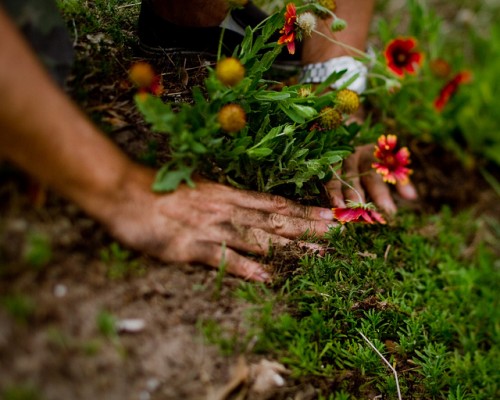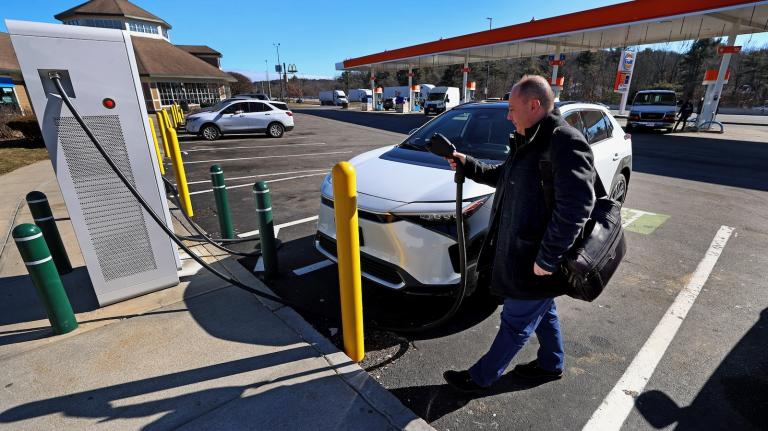 Photo: LOLrenI don’t know about you, but the prospect of trying to improve myself every damn New Year is daunting. I’m not saying I’m going to give up entirely, but I think I may already be as good as I’m going to get.
Photo: LOLrenI don’t know about you, but the prospect of trying to improve myself every damn New Year is daunting. I’m not saying I’m going to give up entirely, but I think I may already be as good as I’m going to get.
So this year, I’ve settled on a different kind of resolution, and I encourage you to do the same. Instead of trying to make myself better, I’m going to work harder to improve the place where I live.
I’m taking some of my inspiration from the Better Block project, a wonderful DIY initiative that began in Dallas and is spreading around the country. The Better Block approach is pretty simple: find a part of the neighborhood that is bleak or underused, but has potential to be a great place. Then get together with some other folks and start making it so — using plants, some paint, traffic-calming measures, music, and local vendors. You can find out much more about how to get a Better Block effort started in your own hood here.
Still sounds overwhelming, right? Don’t worry, you’d be amazed how much you can do with baby steps, starting today. Here are some ideas. Roll up your sleeves, my dears. Now is not the season for excuses.
1. Plant something
I know, I know, it’s freezing outside in much of the country right now. But even if you live in the frigid north, spring will come. Now is a good time to start planning.
Green, living things can radically change people’s moods and health. It’s an idea that biologist Edward O. Wilson explored in his book Biophilia, and it has been backed up in many studies since. A tree or a flower brings great happiness, and it can connect you to the people in your neighborhood. I have a small container garden outside my house, and people often stop to tell me how much they enjoy it.
Don’t live in a place with outdoor space? You could probably swing a window box, at least. That will brighten your view looking out, and also provide a bit of visual relief and joy to people walking by. Or you could join a community garden. Find one near you with this handy map.
If you live in a bigger city, see if your hometown has a program like New York’s MillionTrees campaign, which gives out free trees to citizens and also takes suggestions for places that need them.
Johnny’s Selected Seeds of Maine has plenty of great organic and heirloom seeds you can order in preparation for spring. (It’s an employee-owned company, too.) It’ll be time to start seedlings inside before you know it. And it’s never too early to get ready for guerrilla gardening season.
2. Pick up litter
This one is dead easy. Sadly, no matter where you live, there’s likely to be litter. Maybe it’s blowing around on the sidewalk (that’s nearly always the case here in Brooklyn). Maybe it’s dumped by the side of a beautiful country road. Maybe it’s in the parking lot of your local mall. Maybe (I hate this) it’s on a favorite hiking path.
If the debris not too horribly disgusting — some newspaper, a chips bag, a plastic bag, an empty bottle — just pick it up and dispose of it properly. Seriously, it is OK to do this. Oftentimes, there’s a garbage can just a few steps away. Litterbugs are lazy that way. If you live in a place where you have to drive a lot, consider keeping a garbage bag in the back for precisely this type of occasion.
Yes, you’ll probably want to wash your hands afterward. But remember, a little dirt never hurt anyone. And the feeling of satisfaction is tremendous. This is probably the single easiest mitzvah to perform in any place in the world. As a bonus, you might inspire someone else to do the same thing.
3. Get to know your neighbors
Really, even the irritating ones. I’ve lived on the same block for 10 years, and when I moved in, I had some ugly conflicts with the raucous (understatement) extended family that lives a few doors down. But I stuck to saying hello and letting them know I wasn’t going anywhere. Now they look out for my kid when he hangs out and plays on the street. I’ve been to the wakes of two of the family members in the past year. We care about each other in our weird, neighborly way.
One of my neighbors on the other side has a dog that I babysit when I’m working from home. He and his wife babysit my dog when we go away for the weekend.
If anything bad happens — a blackout, a flood, or worse — these are the people you need to know. It starts with hello.
4. Find out who your government representatives are
All of them. State, federal, city, town. Selectman, alderman, sheriff, dogcatcher — whatever they have in your part of the world. Then, when you have a problem, you know who to lean on to get it fixed. You are paying these people’s salaries. They work for you. Boss them around a little. You might be surprised how they listen to direction.
5. If you see something, say something
In New York, if you see a broken streetlight or dangerous building site or anything else that needs fixing, you can call 311 and report it to the appropriate city department. Your municipality might have something similar. SeeClickFix has partnered with cities like New Haven, Conn., to enable citizens to report problems via mobile phone and online. It’s helped people in communities around the country organize to fix problems ranging from dangerous intersections to fumes from idling vehicles.
Even if your place doesn’t have a program like this, you can call City Hall — or whatever the local equivalent is. You’ve got that number handy now, right?
6. Shop locally
That’s right, the local shopkeepers who brighten your day with a smile depend on you to stop in and spend some money with them. It’s true that sometimes, local stores can cost a little more than the big boxes. But think about what you’re paying for: human interaction, real customer service, and retailers who care about the community they serve, not because it makes for good corporate relations, but because they are part of it.
7. Go for a walk
Yep. Maybe you live in a place where you walk all the time, but if you’re like a lot of Americans, you often leave your house by getting into a car and turning the key in the ignition. Switch up on that. Stroll around your neighborhood. Looks different, doesn’t it? You probably will see things you never have seen before. Maybe some things you’d like to change. Next thing you know, you’ll be lobbying the city council for sidewalks in your part of town.



